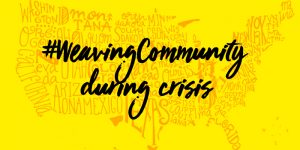OXFORD, Miss. – While most Americans are seeking shelter in their homes, one University of Mississippi professor is working to bring everyone together – online.
Graham Bodie, professor of integrated marketing communications in the School of Journalism and New Media, also serves as the chief listening officer for the Listen First Project, a nonprofit started to depolarize American’s through shared dialogue across socio-political divides.

Weaving Community is a campaign from the National Conversation Project that encourages Americans to connect online and share acts of kindness during the COVID-19 pandemic.
Normally, the organization hosts its National Week of Conversation April 17-25, but since people can’t gather in in coffee shops, libraries and living rooms because of COVID-19, the organization decided to move its efforts online with the #WeavingCommunity campaign.
“We were planning our huge national week of conversation, the biggest week for Listen First and our partner organizations, and then this pandemic happened,” said Shelby Toole, a graduate student in integrated marketing communications whose assistantship involves managing social media for the Listen First Project. “We saw this as an opportunity to really engage a wider audience and let people know they’re not alone by weaving community.”
Weaving Community is a campaign focused on helping people stay connected when a crisis has forced everyone apart, Bodie said. Organizers around the country are planning online conversations using Zoom, Google Hangout and Facebook Live, while participants are logging the acts of kindness in their communities and tracking it all on an interactive map.
Toole said sharing acts of kindness online helps inspire others to perform their own acts.
“We’re talking about caring, connecting and conversations,” Bodie said. “There are planned conversations hosted by our partner organizations, or you can host your own using Zoom and our conversation guide.”
Anyone can share their efforts to spread connection and kindness using #WeavingCommunity on social media or visit https://weaving2020.org/ to see the interactive map tracking acts of kindness or ongoing conversations around the country. Bodie said it’s one way that individuals can see how their efforts are a part of a larger whole.
“If you think about the types of problems we were facing before COVID, from the political rancor to widespread loneliness, all of the divisions and ‘us versus them” language – all these things are problems of listening,” Bodie said. “If we really listen to what people value, believe and hold dear we’ll find more similarities than differences, things that unite us in a shared humanity.
“I think that is what this epidemic is teaching us, if we care to listen and reflect.”